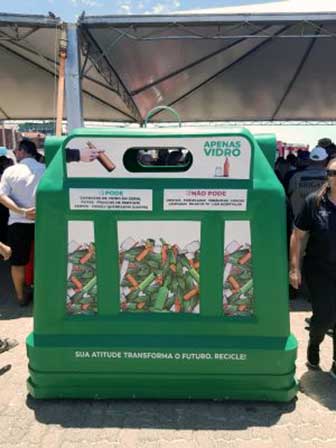In December 2022, a partnership was signed between Verallia and ARCO Waste, which aims to expand glass collection in bars and restaurants in Porto Alegre/RS. The action is part of the Glass Becomes Glass Program and aims to increase the circulation of this noble material in Brazil.
The program is led by Verallia, a European leader and the third largest producer of glass packaging for food and beverages in the world. In Porto Alegre, the action will have the support of ARCO Waste, which operates in the management of waste from restaurants, companies and events.
“We are committed to improving the glass recycling rate in the region, which allows us to contribute to the environment by acting in strategic segments, the major generators of waste. These actions are part of the company’s purpose of reimagining glass for a sustainable future”, says Quintin Testa, general director of Verallia América Latina
Significantly expanding the collection and recycling of glass in large generators, such as bars, restaurants, hotels and events is the objective of this joint action that seeks to encourage the circular economy and the adoption of sustainable practices.
“ARCO has been operating for more than 4 years with waste collection in bars, restaurants and hotels. Glass is an amazing material, with infinite recycling possibilities. We know that their correct disposal was a challenge for these establishments, with concerns about weight, breakage and even whether the bottles would actually be recycled. Over these years, ARCO has created a model that simplifies the storage and collection of glass in these locations and guarantees 100% recycling of the collected glass. The partnership with Verallia will make this service more accessible and thus more establishments will be able to transform the generated glass into a positive impact”, comments Natália Pietzsch, founder of ARCO.

In addition to the action in the capital, the state of Rio Grande do Sul now has 45 Voluntary Delivery Points (PEV) exclusively for collecting glass, which is destined for recycling. The containers are scattered in public places in 9 municipalities along the coast of Rio Grande do Sul. The arrangement of the 45 PEVs is a stage of the Glass Becomes Glass Program and is part of the State Government project called “Verão Total” launched on December 17, in the city of Capão da Canoa/RS.
In addition to Rio Grande do Sul, the containers of the Vidro Vira Vidro Program are being implemented in several other Brazilian cities and the goal is to reach 1,500 points by 2025.
Investments in the region
Verallia announced, in 2021, an investment of 80 million euros to expand its business in Brazil. The destination is the construction of a new furnace in Campo Bom, in Rio Grande do Sul, where the company already has a plant.
With the expansion of the Campo Bom plant, the expectation is to serve, preferably, the national market of wines and spirits. The forecast is that the new furnace will be fully operational in the fourth quarter of 2023. The expansion will allow for the production of around 700,000 glass containers daily at the new facility alone.
Increasing glass recycling is a must
Today, it is estimated by the sector that 75% of the glass consumed goes to landfills and only 25% is recycled. In addition to the accumulation of waste, materials destined for landfills have a cost for municipalities.
To recycle, it is not necessary for the glass to be intact. Just by using shards in the production of new packaging, it is already possible to reduce energy consumption, extraction of natural resources and CO2 emissions. To get an idea, every 10% of shards used in production can reduce 5% of CO2 and 2.5% less energy consumption in the manufacturing process.
As it is a 100% recyclable material, 1 kg of broken glass from recycling that returns to the production process represents 1 kg of new glass.
Glass Becomes Glass Program
Created by Verallia, the Vidro Vira Vidro program expects to collect 24,000 tons of shards per year, which will help reduce CO2 emissions in the glass packaging manufacturing process, energy consumption and the use of virgin raw materials.
One of the differentials of the containers that are used is that they have sensor technology that allows optimization of logistics, so that the truck goes to the PEV only when necessary.
Verallia and sustainability
Worldwide, Verallia is committed to sustainable development in its three dimensions: environmental, economic and social. A reference in glass packaging for food and beverages, it provides the consumer chain with a material that is 100% and infinitely recyclable and inert, guaranteeing the health and food safety of consumers. In all its production processes, Verallia seeks to optimize water and energy consumption, control atmospheric emissions, encourage social development and create new options in glass packaging that require less raw material and that , at the same time, stimulate and facilitate the recycling chain.






